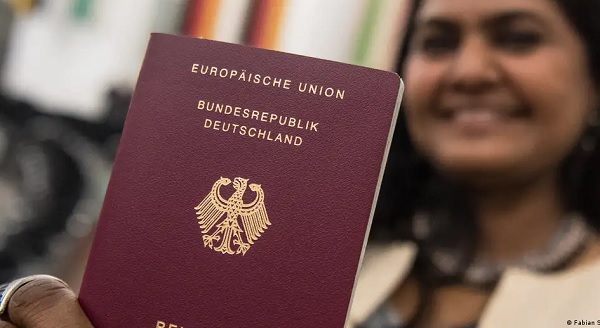More individuals are poised to become German citizens as the government’s new citizenship laws go into effect today, Thursday, June 27, 2024.
The liberalization implies that Germany will now accept double citizenship on principle, rather than as an exemption for EU and Swiss nationals and those who can demonstrate “special hardships.”
According to current German government figures, almost 200,100 persons from 157 different countries naturalized as German citizens in 2023, the largest number in a single year since the start of the century.
The overall number of naturalisations grew by roughly 31,000 (or 19%) as compared to 2022, a little lesser rise than the almost 37,000 (28%) registered in 2021.
“Finally, our law is doing justice to our diverse society,” Federal Interior Minister Nancy Faeser said in a recent statement. “Finally, we recognise the life stories and achievements of many people in our country who immigrated a long time ago and have helped our country to move forward. The message is very clear: You belong to Germany!”
Read Also: Plastic manufacturers threaten to shut down production over 5% tax
In Germany, 14% of people do not hold German citizenship. Though the number has been increasing recently, official records show that just 168,545 foreign nationals who have lived in Germany for at least ten years were granted German citizenship in 2022. This represents barely 3.1% of the total population.
In the upcoming year, that number is expected to climb significantly because state governments around Germany have already seen an increase in applications.
Non-Germans who have been residing in Germany for a while will now have additional rights under the new regulations. The goal of the center-left administration, which consists of the neoliberal Free Democrats (FDP), Greens, and Social Democrats (SPD), is to accelerate integration by increasing the number of naturalizations.
The opposition parties, the Alternative for Germany (AfD), which is partially made up of right-wing extremists, and the conservative Christian Democrats (CDU), argue that the German passport will be devalued.
Here are the main changes:
Multiple nationalities
Applicants to become naturalised citizens will no longer have to give up their previous nationality to become German.
Accelerated procedure
People will be able to apply for German citizenship after lawfully living in the country for five years, rather than the previous eight.
Special achievements rewarded
Naturalisation will be possible after just three years for something the German Interior Ministry calls “special achievements in integration.” Such achievements might include not only learning German, but also excellence at school or in professional life, engaging in civic life or running for political office.
Easier access to citizenship for children
All children born in Germany to foreign parents will in future acquire German citizenship if at least one parent has been living in Germany lawfully for more than five years and has permanent residency.
The controversial “option regulation” — which forced the children of foreign parents to choose a nationality at 18 — is now abolished.
Special recognition for ‘guest worker’ generation
The so-called guest worker generation — mainly Turkish people who moved to West Germany in the 1960s to work — will no longer have to take a naturalisation test. They simply have to prove oral language skills to gain German citizenship. Many are expected to use this opportunity.
The same also applies for foreign workers who moved to the former East Germany to work under a similar program.
Earning a living
Though the new rules apply to everyone in principle, applicants for naturalisation will still have to prove they can earn their own living (though again, people from the guest worker generation can still apply regardless).
Commitment to democracy and anti-racism
A commitment to the democratic order set out in the German constitution has always been a requirement for anyone applying for naturalization. This now specifically excludes anyone found to have committed antisemitic, racist or other inhumane acts. Those who reject equal rights for men and women or live in polygamous marriages are also not eligible for a German passport.
Newly naturalized Germans are also required to commit to protecting Jewish life in the country. The list of questions in the naturalization test is expected to be adapted accordingly.
SOURCE: DW.COM



























